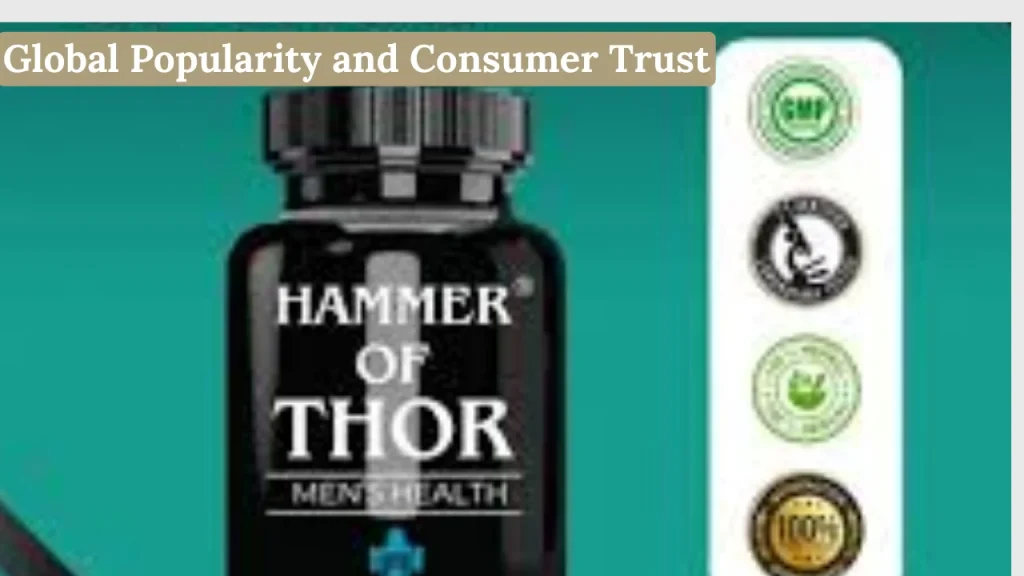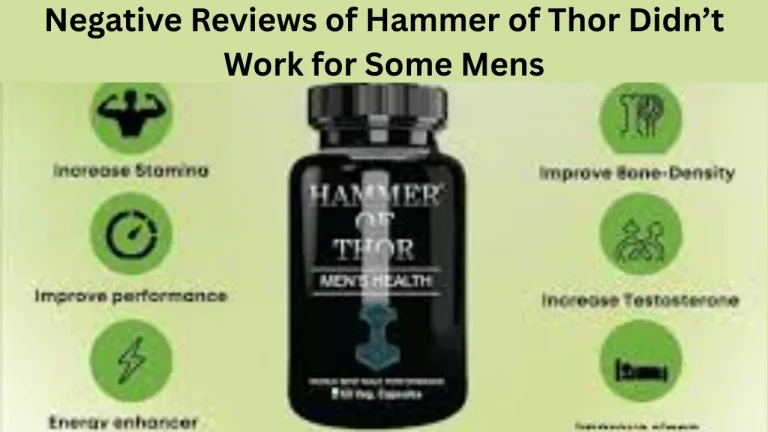Natural or Synthetic? A Closer Look at Hammer of Thor

Supplements often spark debates about their origins. People ask whether formulas are natural or man-made. One popular product that invites this discussion is Hammer of Thor. Many users look at its label and wonder: Natural or Synthetic? A Closer Look at Hammer of Thor. This article explores its ingredients, background, safety, and whether science supports its claims. We will also address the big question early on: Are the Ingredients in Hammer of Thor Scientifically Backed?
What is Hammer of Thor?
Hammer of Thor is marketed as a men’s health supplement. It is commonly promoted as a blend of herbs and minerals that improve stamina and vitality. The product name may vary by region, but the core identity remains linked to energy and performance. When people ask, Natural or Synthetic? A Closer Look at Hammer of Thor, they are asking about authenticity and trust. Supplements can be powerful tools, but their value depends on the quality and type of ingredients.
Why the Natural vs. Synthetic Debate Matters
Supplements can come from two main sources. Natural supplements are made with herbs, roots, and minerals. Synthetic supplements are created in laboratories to mimic natural compounds. For Hammer of Thor, the question becomes crucial. If the formula is herbal, people see it as safer. If it is synthetic, some worry about side effects. Understanding the difference helps consumers make informed choices. The debate around Natural or Synthetic? A Closer Look at Hammer of Thor reflects a broader health trend. People want transparency, especially in products they consume daily.
Versions of Hammer of Thor
Different markets sell different versions of this supplement. The American and European versions often include herbal extracts. The Indian and Southeast Asian versions lean on Ayurvedic traditions. The Egyptian and Middle Eastern versions feature superfoods and plant extracts. Each version maintains a natural theme but with unique cultural influence. That is why Natural or Synthetic? A Closer Look at Hammer of Thor cannot have a single answer. It depends on where you buy it and which formula you choose.
Ingredients Across Different Versions
The composition of Hammer of Thor varies, but the core remains herbal. Below is a table comparing the common versions found globally.
| Version | Key Natural Ingredients | Extra Additives |
|---|---|---|
| American/European | Tongkat Ali, Cistanche, Horny Goat Weed, Mucuna, Shilajit | Pullulan capsule, corn maltodextrin |
| Indian/Ayurvedic | Ashwagandha, Shatavari, Nutmeg, Ginger, Safed Musli, Shilajit | Sugar, tin clax (mineral filler) |
| Egyptian/Middle Eastern | Spirulina, Tribulus, Moringa, Galangal, Seeds | Capsule excipients |
The table shows that the formula uses mostly plant-based herbs and mineral extracts. The extra materials, like sugar or capsule shells, are added for manufacturing purposes. This is why many experts classify Hammer of Thor as natural rather than synthetic.
Natural or Synthetic? A Closer Look at Hammer of Thor Ingredients
The heart of the supplement lies in its herbal roots. Tongkat Ali is known for boosting male hormones naturally. Cistanche has been used in Chinese medicine for centuries for energy and blood flow. Horny Goat Weed supports circulation. Shilajit is a mineral-rich resin with adaptogenic benefits. All these components are natural. When you see Natural or Synthetic? A Closer Look at Hammer of Thor, the evidence points heavily toward natural origins. Synthetic content appears only in fillers and capsule coatings, not the active compounds.
Traditional Wisdom Meets Modern Use
Hammer of Thor draws from traditions like Ayurveda, Chinese herbal medicine, and folk healing. This makes it appealing to people who prefer ancient remedies. Unlike synthetic drugs, the formula does not isolate a single compound. Instead, it blends herbs for holistic balance. The phrase Natural or Synthetic? A Closer Look at Hammer of Thor captures this blend of tradition and modern supplement design. By mixing multiple herbs, the formula aims to provide a rounded benefit rather than a single-target effect.
Is Hammer of Thor Safe?
Safety is the first concern for any supplement user. Herbal does not always mean risk-free. Some herbs may interact with medications. Others may cause mild stomach upset or headaches if taken in high amounts. So, Is Hammer of Thor Safe? Ingredients and Side Effects Explained is a common question. Based on the available reports, most side effects are mild and temporary. Users sometimes report nausea or digestive discomfort. Synthetic drugs often cause stronger reactions, but natural formulas can still affect individuals differently. Safety depends on dosage, purity, and the person’s health condition.
Role of Fillers and Additives
Every supplement includes capsule materials and stabilizers. For Hammer of Thor, fillers like maltodextrin and sugar are minor components. They ensure the powder blends well and the capsule holds shape. These do not change the natural nature of the core formula. Still, they are technically processed, which is why critics sometimes raise questions. However, compared to fully synthetic drugs, these additives are light and safe. When weighing Natural or Synthetic? A Closer Look at Hammer of Thor, it is fair to say that additives do not define the product’s identity.
What Science Says About Key Ingredients
Science has studied many of the herbs in Hammer of Thor. Tongkat Ali shows evidence for boosting testosterone and reducing stress. Shilajit has been researched for energy metabolism and recovery. Horny Goat Weed contains icariin, which may support circulation. Ashwagandha is widely studied for reducing anxiety and boosting stamina. While not all claims are proven, research trends are positive. This adds weight when people ask, Are the Ingredients in Hammer of Thor Scientifically Backed? Many of them are, though more studies are still needed.
Comparing Natural and Synthetic Effects
Synthetic supplements often act faster but may come with harsher side effects. Natural supplements usually work slowly but provide a steady impact. Hammer of Thor fits the second category. Users often report gradual improvement rather than immediate effects. This aligns with the idea that Natural or Synthetic? A Closer Look at Hammer of Thor leans toward the natural side. The long-term safety profile looks better for herbal blends compared to artificial stimulants or lab-made hormones.
Global Popularity and Consumer Trust

Hammer of Thor has become popular worldwide. Its branding connects to Norse mythology, creating a powerful image. But the real driver of trust is its natural appeal. In a world full of synthetic pills, people want herbal alternatives. The search for it reflects growing health consciousness. Consumers prefer plant-based solutions when possible, as they believe these support long-term well-being. Trust comes not from marketing alone but from how well the supplement aligns with natural health values.
Regulatory Status and Challenges
Regulation of supplements differs by country. In some markets, Hammer of Thor is classified as an herbal supplement. In others, it falls under Ayurvedic or traditional medicine. This affects how strictly it is tested before sale. Synthetic drugs require heavy clinical trials, while herbal products often rely on historical usage. The regulatory status shapes how people see it. Some worry about lack of strict testing, while others see the long tradition as proof of safety.
Consumer Reviews and Experiences
User reviews show mixed but often positive results. Many report improved energy and stamina after weeks of use. Others say results are mild but noticeable. A small number complain of no effect, which is common for any supplement. What stands out is that side effects are usually light. This again supports the idea that the formula is mostly natural. Synthetic products often bring sharper reactions. Therefore, reviews back the conclusion in this product acts like a herbal blend.
Advancement of Herbal Supplements Like Hammer of Thor
The supplement industry is moving toward natural solutions. People want products free of harsh chemicals and artificial lab compounds. Hammer of Thor is part of this wave. Its reliance on herbs makes it appealing for the future. However, science still needs to catch up. More research is required to prove the full benefits and risks. As the future unfolds, it will continue to be a relevant question. But trends suggest the natural side will dominate.
Conclusion
After reviewing the evidence, one thing is clear. Hammer of Thor is primarily natural in design. Its active ingredients come from herbs, roots, and minerals. The only synthetic elements are fillers and capsule materials, which are minimal. While safety always depends on the individual, the formula appears to be gentle compared to lab-made drugs. So, when asked Natural or Synthetic? A Closer Look at Hammer of Thor, the answer leans strongly toward natural. Its roots in tradition, global acceptance, and research support its standing as a plant-based option for health and vitality.






